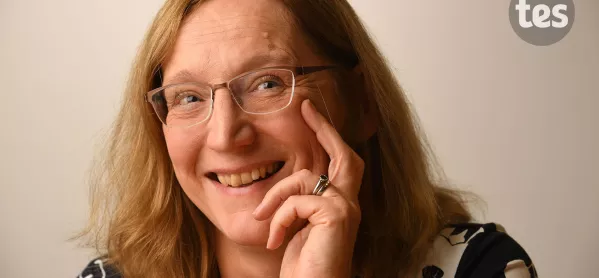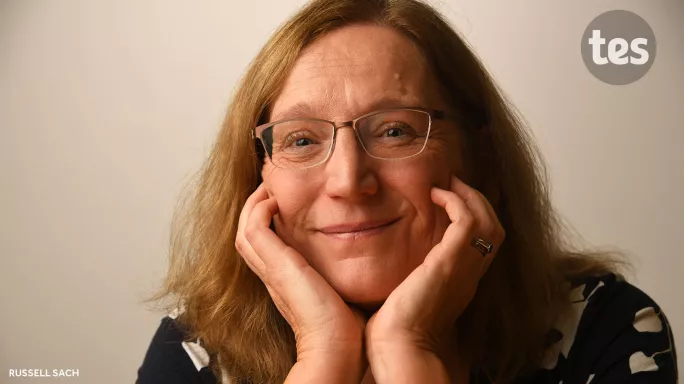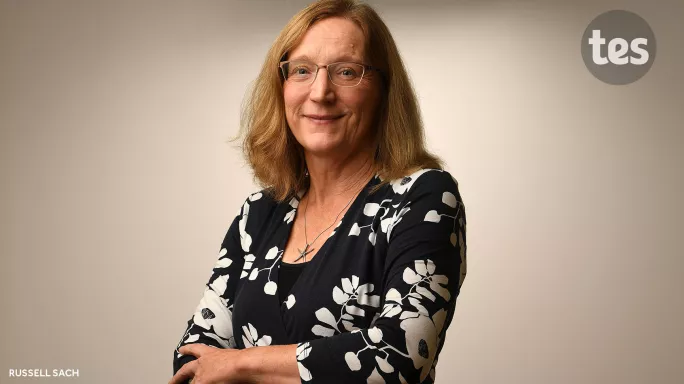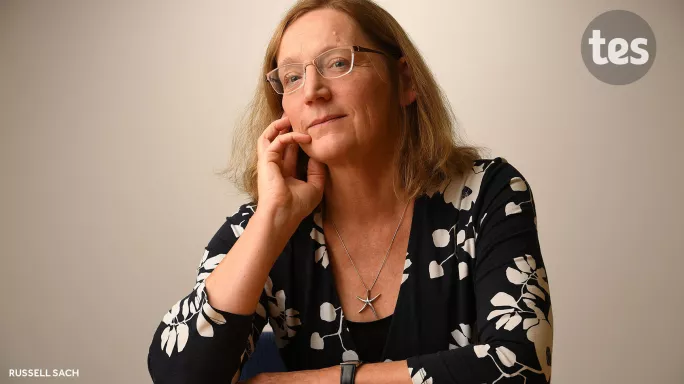- Home
- ‘We know under pressure teachers want a period of calm’
‘We know under pressure teachers want a period of calm’

“I want to encourage women to think about leadership, and not to think they have to be a stereotypical leader who feels confident standing in front of 300 people spouting forth without notes - you don’t have to be that kind of leader.”
Boosting the confidence of women and girls to achieve their ambitions is a personal passion of Jill Duffy’s, the first female chief executive of OCR, one of England’s big three exam boards.
News: New boss announced for OCR exam board
Related: What is OCR? Your guide to the GCSE exam board
More on OCR: A-level results 2019: Role models boost girls’ science
Having been in the role for nearly a year, she pinpoints her two key goals: to dispel stereotypes to increase the number of girls studying Stem - science, technology, engineering and mathematics - and to ensure teachers and pupils are well supported by OCR.

Throughout her interview with Tes, she projects a quiet, measured confidence that suggests her desire to model a different kind of leadership style.
Duffy was educated at state schools and she understands the pressures teachers are under very well. She went on to do a PGCE before moving into education publishing and Duffy’s mother was a teacher at her primary school in Skelmersdale, Lancashire.
Yet behind the quiet demeanour, there is a strong sense of determination. She is a keen runner, and enjoys jogging through the hills of Oxfordshire - where she still has a base - or exploring Blenheim Palace near Woodstock. Cambridge is “too flat” she says.
At A level science, OCR has now included the study of female role models such as Rosalind Franklin, who made significant contributions to the discovery of DNA. Duffy says that making examples of women’s success in science and computing visible can help girls see that these subjects are also for them.
“Often it can just be about the examples - if you look at the GCSE science specification, actually it doesn’t mention any scientists in that, but we can give examples outside the spec. I think there’s absolutely more we can do there,” she says.
Part of her interest is personal - she and her husband, both English literature graduates, are “the proud parents of two female scientists - I’m not sure how we managed that, but it’s amazing to see them starting to achieve in science.”
She tells how her eldest daughter has completed a PhD in science at the University of Oxford, having recently created the first-ever ring of pure carbon. Duffy confesses her bemusement about the technical aspects of the discovery. But she was most taken aback by her daughter’s lack of confidence following the achievement, which she puts down to stereotypes around how successful women should behave.
“Last night she came round and she was saying to me, ‘Mum, I don’t like talking to people about what I’ve achieved, I don’t like drawing attention to myself’. And I was thinking, ‘You’ve made a major breakthrough in science, how many men would be sitting there saying that?’
Role model
“I said: ‘Well, you need to be a role model now.’ It’s a bit tough being one of my daughters,” she laughs. “I have to make sure they’re looking after themselves and being kind to themselves as well, just as I do for myself.
“But that sort of attitude she had - ‘I don’t want to make a fuss about it’ - is a very female attitude, and doesn’t help longer term. She doesn’t feel able to shout about her achievements, and I think that’s quite a female thing.”
Duffy is therefore keen to challenge gendered stereotypes, both through the exams offered by OCR, and the kind of leadership she embodies herself. One senses that, behind her somewhat quiet façade, she can be formidable when prompting women to challenge themselves.
As a sponsor of a women in leadership group, she has led workshops on different leadership styles, and remembers one woman saying, “All I want to do is do a good job and be recognised for it, isn’t that enough?
“I said, ‘No, it’s not enough - if you want to be a leader and get on, you can’t just sit there thinking ‘Oh, if I do a good job I’ll automatically get promoted.’ The world doesn’t work like that.”
In her own management of staff, she says she tries to be “humane” as opposed to being overly directive. She also tries not to leave her “personal life at the door - I’m quite open about what’s going on”.
She quips that perhaps her employees are bored hearing about her daughters - “but that’s my context, it comes in quite a lot to what I do”.

“You have to be authentic as a leader,” she says. “It’s you, but on a good day.”
‘We’re not just targeting top-notch schools’
Another stereotype that she is keen to dispel is that OCR is the favoured board for academically challenging or selective schools. OCR has a small market share at GCSE, but a larger one for A level, and some teachers regard it as the go-to board for the private sector and grammar schools.
“I think we know that there’s that perception - I think we’d see it as a perception, and our aim is that we create qualifications, GCSEs and A levels that are for all students - we’re not just targeting top-notch schools,” she says.
“When you look at who our big customers are, they’re not independent schools, there are a lot of state schools, a lot of big FE and sixth form colleges, so I think it is more a perception than reality.”
Duffy is careful not to blame schools or teachers for holding this view, adopting the kind of measured response that must be useful when running a major exam board.
“But perception is reality, if that’s the perception, then it’s for us to change that - I’m not here saying everyone’s got it wrong.”
She points out that the board has a strong track record in offering vocational qualifications through Cambridge nationals - vocational qualifications for 14-16 year-olds - and Cambridge technicals, offered to students aged 16 or over.

“We want to create qualifications that are applicable to all students, for those students who want to go down an academic pathway, and for those who want to go down a vocational pathway as well,” she says.
Ms Duffy describes one of the advantages of working for a board such as OCR is its close links with the University of Cambridge, a key difference from her previous role at Pearson - this enables OCR to work with researchers to make both teaching and assessment more accessible.
“Working at OCR, we are part of Cambridge University, so we have a massive amount of research expertise into assessment. We have Tim Oates, who runs the largest assessment research team in the whole of Europe,” she says.
She points out that yesterday she had a meeting about Cambridge Maths, a joint project across Cambridge Assessment, the university maths department and Cambridge University Press, which is exploring the best ways of teaching and assessing maths.
She says OCR and the university have “a very direct relationship” and that this means they can apply expertise to particular issues, such as the challenge of assisting the forgotten third - the third of pupils who leave school without securing a grade 4 “standard pass” in maths and English GCSE.
“Cambridge Maths is looking at areas like how can we teach maths better and how can we assess it better - are there things we can be doing for that forgotten third?”
She adds that they “aren’t forgotten any more, they’re quite high-profile, in fact”. But she says there is a need to make the context of exams “more real life for students”.
“Students need to know how it’s applicable to them. The forgotten third are probably not going on to do a maths A level. But they do need to have maths to use in the rest of their life, and they do need to have that literacy, so how can we do that within the existing qualifications we’ve got at the moment?
“We’ve definitely not forgotten about them - we talk about them an awful lot. I think what we can bring that others can’t is that perspective across Cambridge - are there different approaches to teaching maths that will make it better?”
‘On technology, we need to be innovative’
While thoughtful about the impact of the qualifications system on lower-ability pupils, Ms Duffy is diplomatic about recent reforms to which set out to create tougher GCSEs. She says she feels they have prepared pupils better for A level study than legacy exams.
“I think [the reforms] have bedded in well, and all credit there to teachers, they’ve done a brilliant job with what are quite different qualifications, and a new grading scale.
“If there are things that across the industry we haven’t quite got right, we’ll look at them and make changes. What most teachers say to us at the moment is, ‘Just give us a period of calm really when there isn’t really change - but teachers have been saying that since the year dot - it doesn’t quite happen in education, but that’s what they want’.”
Duffy’s secondary PGCE gives her some understanding of teachers and informs the kinds of help she aims to offer as the leader of OCR.
“Teachers are under a lot of pressure and they haven’t got very much time, so it’s about how we can support them better,” she says.
She aims to visit schools as often as possible, meeting headteachers and trying to address their concerns. She says heads are often appreciative of the visit, and OCR is generally described in feedback as a “friendly” and approachable board.
One improvement heads often suggest is improving the exam timetable. There are still clashes where pupils must hand in their mobile to the school overnight to avoid liaising with peers, and the timetable of assessment seems to “creep” earlier into the school year, limiting valuable teaching time.
Duffy is also keen to use technology to improve assessment, although she acknowledges the sector has been talking about computerised assessments for some time, whilst largely clinging to paper-based exams.
“The thing that’s always held it back so far is technology in schools, and that’s something we still need to crack really, how to move more to digital assessment.”
“We need to be innovative - if it’s just a diet of multiple-choice, then that’s not going to test the range of things we want to test, so it’s thinking about how it can be used in different ways. We haven’t quite got there yet in terms of its full potential, but in time we hope that we will.”
What is clear from meeting Ms Duffy is her strong desire to make teachers’ lives easier. This perhaps stems from having spent some time in the profession herself. Can she foresee a return to the chalkface?
“What I really liked about teaching was coming up with the teaching ideas, the different ways of doing things,” she says. “I always thought I might go back into teaching. I haven’t quite yet, but there’s still time!”
CV: Jill Duffy
- Completed A levels at St John Rigby VI Form College in Wigan after studying at St Bede’s High School in Ormskirk
- Read English language and literature at Oxford University
- PGCE at Oxford University
- Joined OUP as a senior editor, following 18 months at Puzzle magazine (1986-1989)
- Joined Hodder & Stoughton as a publisher (1989-1992)
- Became publishing director at Ginn (1992-1997)
- Led secondary and vocational learning at Harcourt International publishers (1997-2006)
- Joined Pearson Education as managing director of secondary and vocational learning (2006-2008)
- Became vice president and then senior vice president of UK schools at Pearson, managing all qualifications including GCSEs and A level (2008-2017)
- Director of Jill Duffy Consulting (2018-2018)
- Became chief executive of OCR (2018-present)
Keep reading for just £1 per month
You've reached your limit of free articles this month. Subscribe for £1 per month for three months and get:
- Unlimited access to all Tes magazine content
- Exclusive subscriber-only stories
- Award-winning email newsletters



